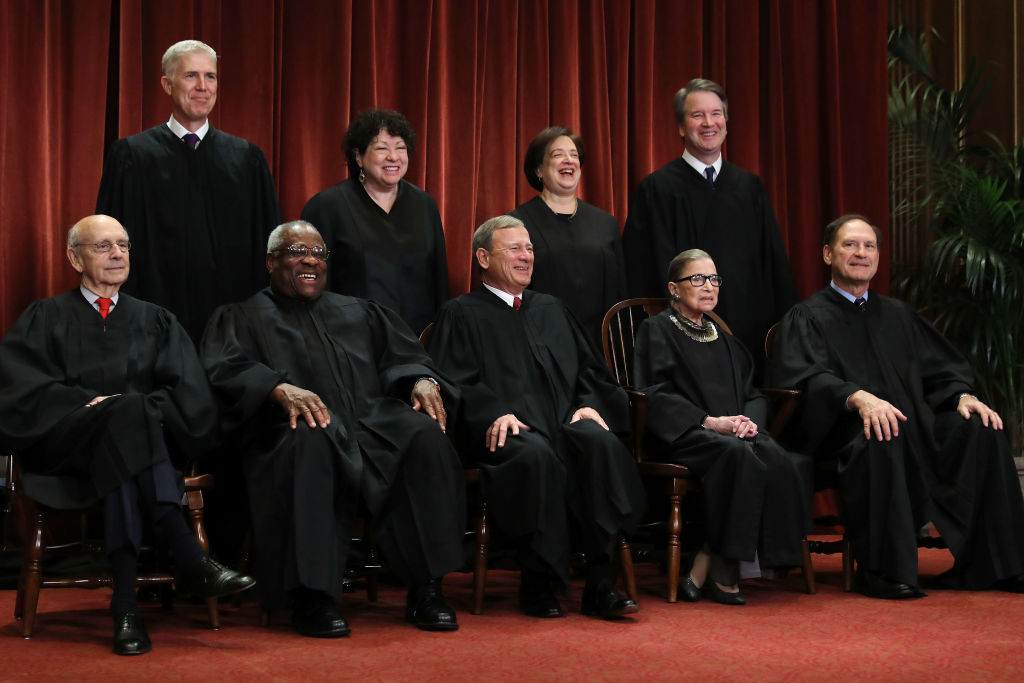The death of Justice Ruth Bader Ginsburg is a terrible blow to Democrats, but there is one important comfort — the principled arguments they made in 2016 after the death of Justice Antonin Scalia prevail.
Democrats insisted that the Scalia vacancy should be filled swiftly by President Obama’s nominee, Merrick Garland, but the Republican-controlled Senate refused to hold hearings. Their pleas were not in vain, however, and Senate Majority leader Mitch McConnell has now been persuaded by the logic and compassion of the Democrats’ case — and this time the president’s nominee will, probably, get a speedy hearing. It took four years, but Democrats will get the process they wanted.
Is this too soon? Just remember, as Democrats dredge up examples of Republicans in 2016 saying an election should intervene before filling a Supreme Court vacancy, that the Democrats are guilty of the same moral crime with which they would charge the GOP. They can’t say one thing about Garland and another about Trump’s nominee.
There are in fact plenty of examples of Supreme Court justices being nominated and confirmed with an election on the horizon. And there is even precedent for a president who has been defeated to make Supreme Court appointments just after an election, too, in the lame-duck period before the new president and Congress take office. After John Adams lost the election of 1800 to Thomas Jefferson, he pushed through as many judicial appointments as he could, and that included making John Marshall the chief justice of the Supreme Court. Marshall is all but universally revered today — not least because his decisions established the very principle of judicial review. The court matters today in large part because of the appointment of Marshall in circumstances not altogether unlike those that might emerge after November 3, if present polling that shows Trump losing proves correct.
The country was even more divided in 1800 than it is now, though the form that partisan animosities took were quite familiar. Just as Democrats have spent three years insisting that Donald Trump is a dangerous sympathizer, if not an actual puppet, of Vladimir Putin’s wicked Russian regime, the Federalist party poured its energy into depicting Thomas Jefferson as a lunatic left-wing ideologue madly in love with the French Revolution, longing to unleash anti-clerical bloodshed in this country. Jefferson and his coterie, for their part, were just as emphatic in warning that Adams and other Federalists were royalists plotting to undo the American Revolution and possibly reunite the country with the British Empire, in cahoots with the British.
Jefferson won and the country was not plunged into Gallic revolutionary terror — nor would it have become a British colony again if Adams had prevailed. Adams’s son loyally served Jefferson’s successor’s successor, President James Monroe, and by the end of their lives Adams and Jefferson were of one mind, more or less, in deploring the real enemy of the American way of life and the rule of law itself — that demagogic, wannabe dictator Andrew Jackson!
Jefferson, in remarks he supposedly made to Daniel Webster, sounds almost verbatim like some Atlantic writer fretting about Trump: ‘I feel much alarmed at the prospect of seeing General Jackson President. He is one of the most unfit men I know of for such a place. He has very little respect for laws and constitutions… His passions are terrible…he is a dangerous man.’ Election after election, America has always been on the hysterical brink of ‘fascism.’
Yet elections and the Supreme Court do matter, and if one of the persistent myths of American politics expects the arrival of the Antichrist in the Oval Office any day now, another persistent myth is that of a non-political Supreme Court.
Roe v. Wade, the refrain goes, sparked these desperate battles over SCOTUS. When pressed, those who say this — often they’re centrists of a somewhat leftward tilt, but I’ve heard it from certain conservatives, too — will reluctantly admit that, yes, other decisions had this effect, not just recent decisions on ‘social issues,’ but Brown v. Board of Education too. And before that there was Dred Scott v. Sandford.
Depoliticizing the Court and sending contentious questions back to states, where they vanish in a puff of benign localist consensus, is simply not possible. It hasn’t been since the Civil War, whose outcome required the passage of constitutional amendments to guarantee that states couldn’t continue to deny black people their rights as Americans. The amendments, however, turned the Bill of Rights upside down. What had started out as restrictions on the federal government — hence ‘Congress shall make no law…’ — became, thanks to the interpretations of the 16th and 17th Amendments, restraints on every level of government, with the federal judiciary deciding what those restraints would mean in legal reality.
Freedom of speech, freedom of religion, the right to keep and bear arms, and rights of contract at every level of American society are tied into the Supreme Court through the incorporation doctrine. Roe or no Roe, Brown or no Brown, this always had political implications and was sooner or later bound to lead to increasing politicization of the confirmation process.
This is not something that is going to go away if Donald Trump gets to appoint a sixth Republican justice to the Court (or a seventh if he’s reelected and Justice Breyer bows out), and it will not go away if Joe Biden wins in November, either. Nor will Democratic dreams of packing the Court solve the problem, though doing so would shift the conflict to a new and likely even nastier phase. What Democrats pack, Republicans can pack or un-pack, too.
What voters should heed carefully are the increasingly openly stated plans that progressives have to turn America into a one-party state, through a combination of mass immigration, identity-group exploitation, ranked-choice voting, abolition of the Electoral College, attempting to do away with equal representation in the Senate, and packing the Supreme Court. These are not the tactics of a Democratic party that thinks it can win by playing by the rules, though, at the same time, Democrats seem unable to accept the fact that in competitive elections they will sometimes lose.
Instead of making a stronger pitch to Americans that they have written off as ‘deplorables,’ the Democrats want to snuff out competition by changing the game. That’s not a formula for ‘fascism,’ but it’s a good way to hasten a legitimacy crisis.
The genius of the federal system is that even when the national head-count minority wins — thanks to the Electoral College or equal representation in the Senate — the head-count majority doesn’t lose everything: it still has plenty of power in places like California and New York. But change the system so that plebiscitary majorities always prevail nationally, and it becomes easier to bully the losers.
The cult around ‘Notorious RBG’ has displayed the emotional fragility of white liberals as well: upon news of the justice’s death, Twitter and Facebook were flooded with emotional confessions from liberals who were ‘literally shaking’ or crying over the 87-year-old’s death. I don’t remember Justice Scalia’s death being met with strangers bursting into tears.
[special_offer]
So as much as it may pain Democrats to do so, they should grow up and accept the terms. Don’t cry, don’t riot — whatever you do, don’t be a little Walter Mitty fantasist like former CNN darling Reza Aslan, who now tweets, ‘If they even TRY to replace RBG we burn the entire fucking thing down’ (no you won’t, tough guy) — just accept that Donald Trump is President and Mitch McConnell is Senate majority leader, as a result of free and fair elections. If you want to oppose the president’s nominee to replace Ginsburg, you are best advised to do it in terms that Americans who are not hard left and abortion-rights absolutists will find persuasive. If nothing else, this is an occasion to put NeverTrump, Inc. to the test: are these ex-Republicans Democrats now, or are they still pretending to be conservatives at some level? Call their bluff.
In truth, the odds of Roe being overturned, even if a Republican fills Ginsburg’s seat, and another ultimately fills Breyer’s, seem pretty slight — given the jurisprudence we have seen so far from Republican appointees like John Roberts and Neil Gorsuch. But abortion is a topic for debate and, if anything, the context of a presidential election may help clarify the American public’s commitments. There’s a case to be made that the problem with the Supreme Court is not that it’s over-politicized, but that it isn’t politicized enough — that is, that Americans don’t think nearly enough about the Court when they cast their votes for the Senate and President. Conservatives and Republicans — two categories more distant from one another than Democrats and progressives — have their work cut out for them in making their cases, too. If you think being a progressive Democrat is stressful right now, just imagine what it’s like being Susan Collins.
The battle is on for the White House, for the Senate, for House seats, and — in a different way — for this Supreme Court seat. Politics has real stakes, and it’s a rough business. But that’s all the more reason to deal with it realistically and not like an emotional child. Ginsburg herself, through her friendship with Justice Scalia and her support for high culture, showed how progressives should conduct themselves.


















